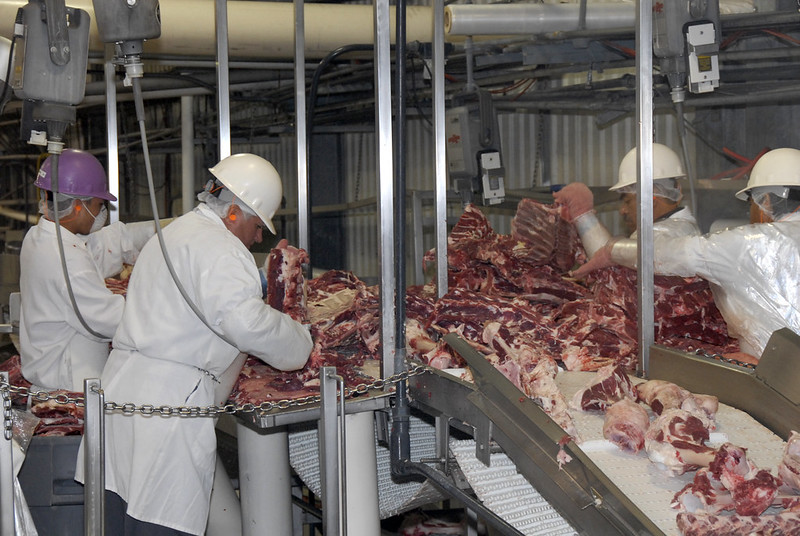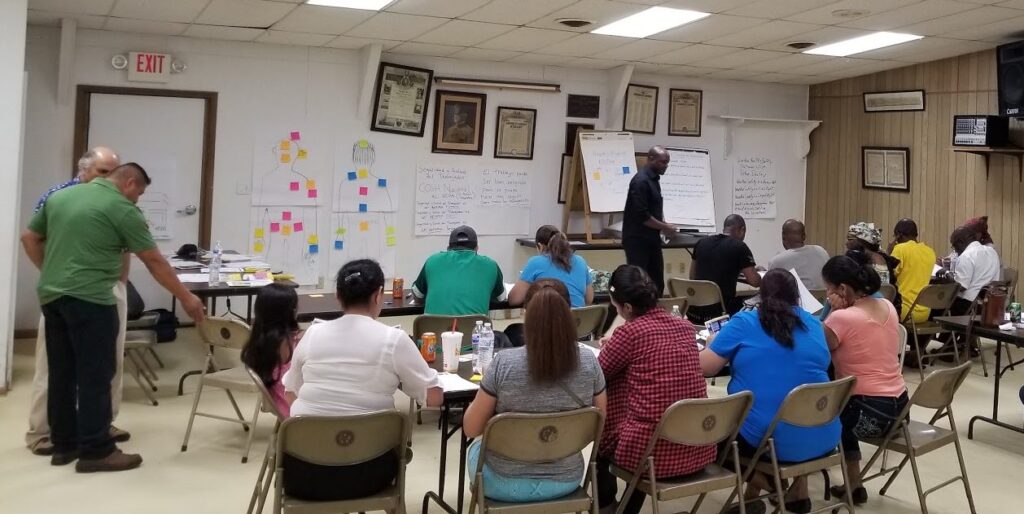
Worker Justice
The U.S. food system has always capitalized on the exploitation of workers, since its origins in plantation agriculture that relied on the forced labor of enslaved Africans. Today, meatpacking workers are subject to some of the most brutal working conditions in the labor market.
FarmSTAND envisions a food system that ensures the health, safety, and dignity of work for all food system workers. To work toward making that a reality, we work alongside organizers and organizations that directly serve workers to strengthen protections and dismantle the structures that contribute to their harm. We are also committed to uplifting the voices of workers who demand prioritizing people over profit — and holding corporations accountable when they refuse to do so.
Worker Abuses in the Food System
For decades, meatpacking workers have endured 11-hour shifts practically shoulder-to-shoulder on high-speed lines leading to frequent and sometimes serious injuries.
Workers at other points along the food chain have also long faced systemic exploitation, including farmworkers who are subject to wage theft, pesticide exposure, and sexual harassment at horrific rates, and warehouse and delivery workers who are frequently misclassified as independent contractors and denied basic worker protections.

COVID-19 & Food System Workers
As the COVID-19 pandemic unfolded, the industry forced meatpacking workers to continue to work in the same conditions as always – without meaningful changes to allow for social distancing or other public health recommendations – even as shelter-in-place orders were instituted across the country. When workers got sick, they were sent to “company clinics” with doctors employed by the companies, who often sent them back to work. As a result, COVID-19 spread throughout food processing plants, which quickly became epicenters of outbreaks. Nearly a year into the pandemic, over 57,000 meatpacking workers had tested positive for the virus, and more than 280 workers had died.
While the statistics are most striking in the meat processing industry, a similar pattern has emerged across the food chain. Farmworkers, delivery workers, and restaurant workers have become sick and died because their employers refused to bear the costs of the precautions necessary to keep workers safe.
In April 2020, we partnered with Towards Justice and the Heartland Center for Jobs and Freedom to bring the first lawsuit seeking injunctive relief to protect meatpacking workers from coronavirus, representing Rural Community Workers Alliance and an anonymous worker against Smithfield. The case was covered in the New York Times, and the Washington Post featured an op-ed by Jane Doe recounting the experience of seeing the impact of the virus throughout her community, while hearing nothing from Smithfield.
While workers at the plant were provided with certain protections due to this action, ultimately, the Court declined to hear the matter, and deferred to the authority of the Occupational Health and Safety Administration to consider the issues raised.
In July 2020, we joined Towards Justice, Nichols Kaster, and Justice at Work to file a lawsuit against Secretary of Labor Eugene Scalia for failing to compel a slaughterhouse to protect its workers from contracting covid-19 after an outbreak at a Maid-Rite processing plant in Pennsylvania. Despite ongoing advocacy from Justice at Work, OSHA delayed inspecting the plant, then gave advance notice to the company, enabling it to temporarily change its practices for the inspection.
We also also joined 25 local and national groups to call for the resignations of Labor Secretary Eugene Scalia and Loren Sweatt, who oversees OSHA, for their failure to protect workers during the pandemic.
Resources
Disparate Harm to Communities of Color
Many of these workers are members of marginalized groups – including women, people of color, immigrants, and refugees – and historically have had few avenues to effect change in their workplaces, especially as industry consolidation and the declining influence of labor unions have eroded worker power.
The industry intentionally hires immigrant and undocumented workers who are entitled to fewer legal workplace protections. Undocumented workers in Michigan, for example, do not receive workers’ compensation after getting injured at their often-dangerous jobs. When the predominantly Black workforce in Southern poultry plants began to demand better working conditions, poultry companies purposefully recruited Latino people to work some of the most hazardous and lowest-paid jobs in the country.
The industry then intimidates these very workers into silence. In 2019, Immigration and Customs Enforcement agents raided seven poultry processing plants in rural Mississippi. While no immediate charges were brought against the employers, 700 workers were arrested. Even more concerning, the raids followed the settlement of a sexual harassment suit with the employees at the raided facility.
Tactics like activating ICE on their own employees and lobbying states to pass for “ag-gag” laws — which threaten workers before they even speak out — are just a few of the ways the food industry systemically creates a culture of fearful compliance.
The impact of companies’ non-response to COVID-19 also disproportionately hurt workers of color and other marginalized identities. In July 2020, a nationwide coalition of organizations that advocate for meat process workers and allied groups came together to file a civil rights complaint with the U.S. Department of Agriculture that underscored this discriminatory impact. The complaint alleged that megacorporations Tyson and JBS adopted policies that reject critical CDC guidance – social distancing on meat processing lines – to stop the spread of covid-19 at their processing facilities, and that the results of their operating procedures have a discriminatory impact on the predominantly Black and Latino workforce at the companies’ plants.
How We Make Change

Learn more about our worker justice cases.